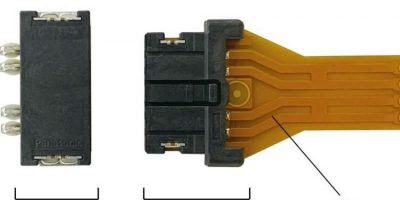Connector eliminates wire harness to make room in automotives
Panasonic has created a connector that allows direct connection between an automotive flexible printed circuit (FPC) and the board. It eliminates the need for wire harnesses previously needed for connection, allowing the use of fewer components and fewer assembly person-hours for vehicles, as well as making room in the vehicle.
Production of the board to FPC connector (CF1) begins this month. Recent changes in legislation around automotive LED lighting in Europe and Japan have led to an increase in the use of daylight running lamps (DLRs) and improved designs for vehicle compartment instrument panels, for example, in vehicles. As a result, says Panasonic, demand for automotive FPCs is expected to grow, accompanied by greater use in cable connection applications such as battery management systems (BMS).
Although FPCs and boards are conventionally connected mainly by using relay harnesses or by soldering FPCs and boards, there are drawbacks such as the additional weight and poor assembly workability of wire harnesses.
Panasonic has designed the connector with a proprietary metal terminal connection structure, which allows direct connection between the FPC and the board. It eliminates the need for relay harnesses, allowing the use of fewer components and assembly person-hours.
The connector’s double-clip contact structure achieves excellent resistance to vibration, says Panaconic, making it compatible with automotive applications such as LED lights and BMS. The double-clip contact structure grips the plug, i.e., the metal terminal (FPC side), and the receptacle (board side). The connector can also be used for FPCs for connecting BMS battery packs and boards, as well as for LED lights that require resistance to vibration.
The connector’s inertial lock structure prevents incomplete engagement for high reliability.
The connector is rated for 2.0A per pin and 50V DC. It operates in an ambient temperature range of -40 to +125 degrees C.
Contact resistance is 20 mOhm maximum and insulation resistance is 100 MOhm and above.




